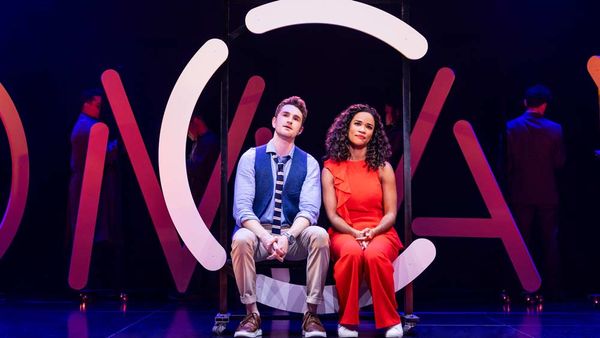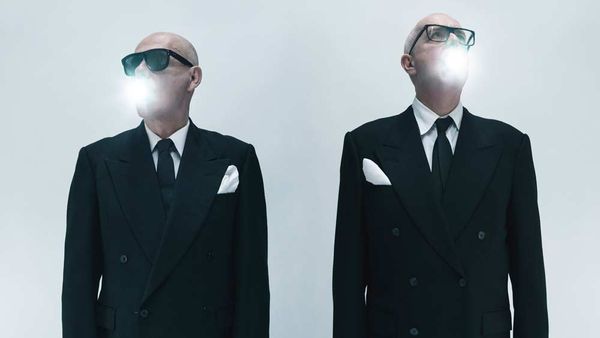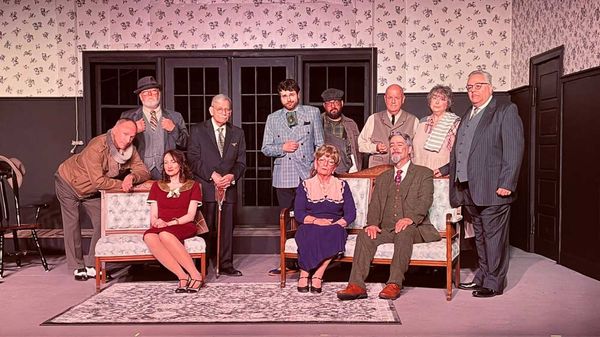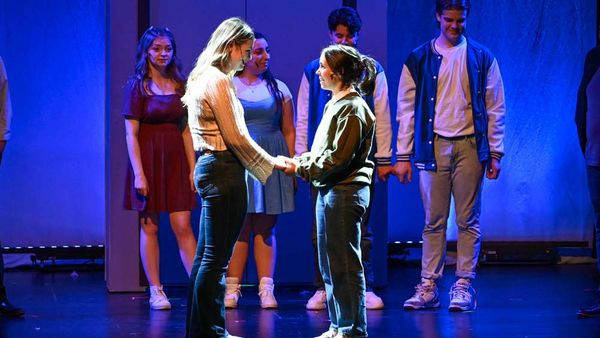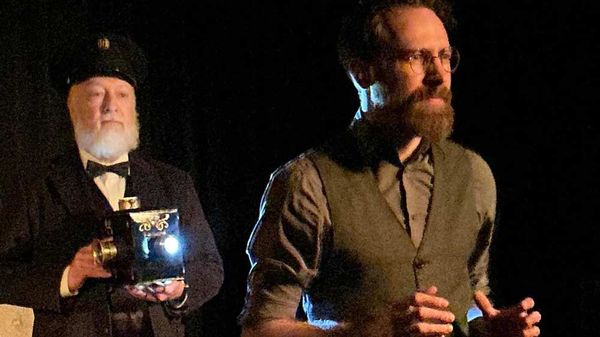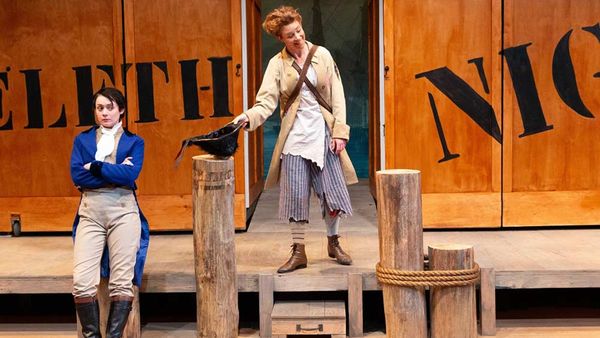October 12, 2016
Pirandello's Henry IV
Christine Malcom READ TIME: 4 MIN.
Remy Bumppo's tag line, "think theatre," could not be more appropriate to the play the company has chosen to open its twentieth anniversary season. "Pirandello's Henry IV," brilliantly envisioned by Tom Stoppard is hilarious, intellectually exhausting and moving. Remy Bumppo's production, deftly directed by Nick Sandys, is an intimate, demanding, exhilarating rendition of it.
The plot, such as it is, centers around the title character. Or rather, it centers around a nameless man, twenty years mad, who believes himself to be the eleventh century German Emperor, Henry IV. Or who doesn't believe that at all.
The play opens with three seasoned actors, employed to maintain the man's delusion, trying to coach a new hire who has come into the gig having studied up on the wrong Henry IV entirely. Anxiety is high, not simply because the cast is a man down, but because Henry is about to have influx of visitors, namely his nephew, Matilda, the woman who might or might not have scorned him and the man who managed to win her affections, accompanied by a renowned psychoanalyst and Matilda's daughter, Frida.
Their reason for intruding on Henry's delusion at this particularly moment is nearly irrelevant. The psychoanalyst's plot for returning Henry to sanity by confronting him with hard evidence of the passage of time is convoluted. Every line of dialogue, every action is about performance, identity, authenticity. Every moment is about laying bare the truth that sanity is subjective, contingent and not at all the point of anything.
Joe Schermoly's set plays beautifully with all these themes of artifice and performance. The stage in the black box theater is set up as a thrust bounded with downstage pillars and a hint of lattice work that insistently suggests a gazebo or some other structure imposed on a garden or other man-made landscape.
The dais is a thrust within a thrust, topped with Henry's throne. The upstage wall comprises four arched niches, two occupied by life-sized portraits of Henry and Matilda, the latter in the guise of Henry's sworn enemy, Matilda of Canossa.
Juxtaposed with Rachel Lambert's costumes and Mike Durst's skillful Lighting Design, the set is as cuttingly witty as the play itself. The "actors" are outfitted in standard "background Crusaders numbers one through four" tunics, cowls and sword belts. Each costume is distinct enough to look just slightly mismatched to the others and still utterly off-the-costume-rack generic.
In contrast, the visitors are decked out in magnificent Gatsby-era flash and finery. These protrude just enough from under the period costumes they don to put their plan into action that they serve as a broad reminder of how ridiculous, condescending and deluded that plan is. Though the emphasis is on this visual play, Lambert's identical costumes for Matilda and Frida (which, in turn, are identical to the portrait of her) are a poignant commentary on regret and the passage of time.
However beautifully rendered, though, a production of this play is nothing without truly skilled, truly smart performances. It's a high-wire act, and this cast executes it so beautifully that it's only in retrospect that the audience has any time at all to envision how it could have gone horribly wrong.
In the opening scene, Landolf (Jake Szczepaniak), Ordulf (Michael Turrentine), Harold (Martel Manning) and Bertold, the new guy (Chris Vizurraga), contemplate who they are and who they must be. It's brief, rapid fire and dizzying, not just evoking Stoppard's own "Rosencrantz and Guildenstern are Dead," but paying homage to its origins. All four actors are sharp, attentive to one another and so intimately familiar with the rhythms of the dialogue and the long silences that it feels like the world's smoothest roller coaster ride.
The arrival of Matilda (Patrice Egleston) and her retinue comes with an abrupt shift in tone to, on the surface, something closer to conventional drama. Each character, with the exception of Frida (Clare Cooney), seems certain that they are the one in control of the situation; thus the dialogue takes on all the dramatic weight of an operatic quartet.
Courtesy of a fantastic performance by Egleston, it's Matilda the audience's eye follows for the whole of the scene. The tension climbs as she prowls the stage, casting a critical eye on her own portrait and kicking back in the Emperor's throne.
As captivating as Egleston is, though, it depends on the kind of collaboration with her cast mates that speaks of absolute trust and strong direction. James Houton, Noah Simon, and Chris Amos more than ably support this as, respectively, the blustering, charismatic, would-be manipulator Belcredi, the pompous, clueless Doctor, and the earnest and well-meaning nephew, Di Nolli.
These performances, and they are excellent, are all the warm-up act, though. It's nothing short of a privilege, and no better example of what is exceptional about the Chicago theater scene, to let Mark L. Montgomery's performance as Henry wash over you in the intimate space at the Greenhouse.
The world of the play and the world at large fall silent when he takes the stage. His rage is terrifying, his plea to be heard -- to be understood, to have some kind of companionship in the lonely, all-too-"woke" kingdom he's carved out for himself -- is profoundly heartbreaking.
"Pirandello's Henry IV" runs through Nov. 13 at The Greenhouse Theater Center, 22257 N. Lincoln Ave, Chicago. For tickets or information, call 773-404-7336 or visit www.RemyBumppo.org
Christine Malcom is a Lecturer in Anthropology at Roosevelt University and Adjunct Faculty in Liberal Arts and Visual and Critical Studies at the School of the Art Institute of Chicago. She is a physical anthropologist, theater geek, and all-around pop culture enthusiast.


